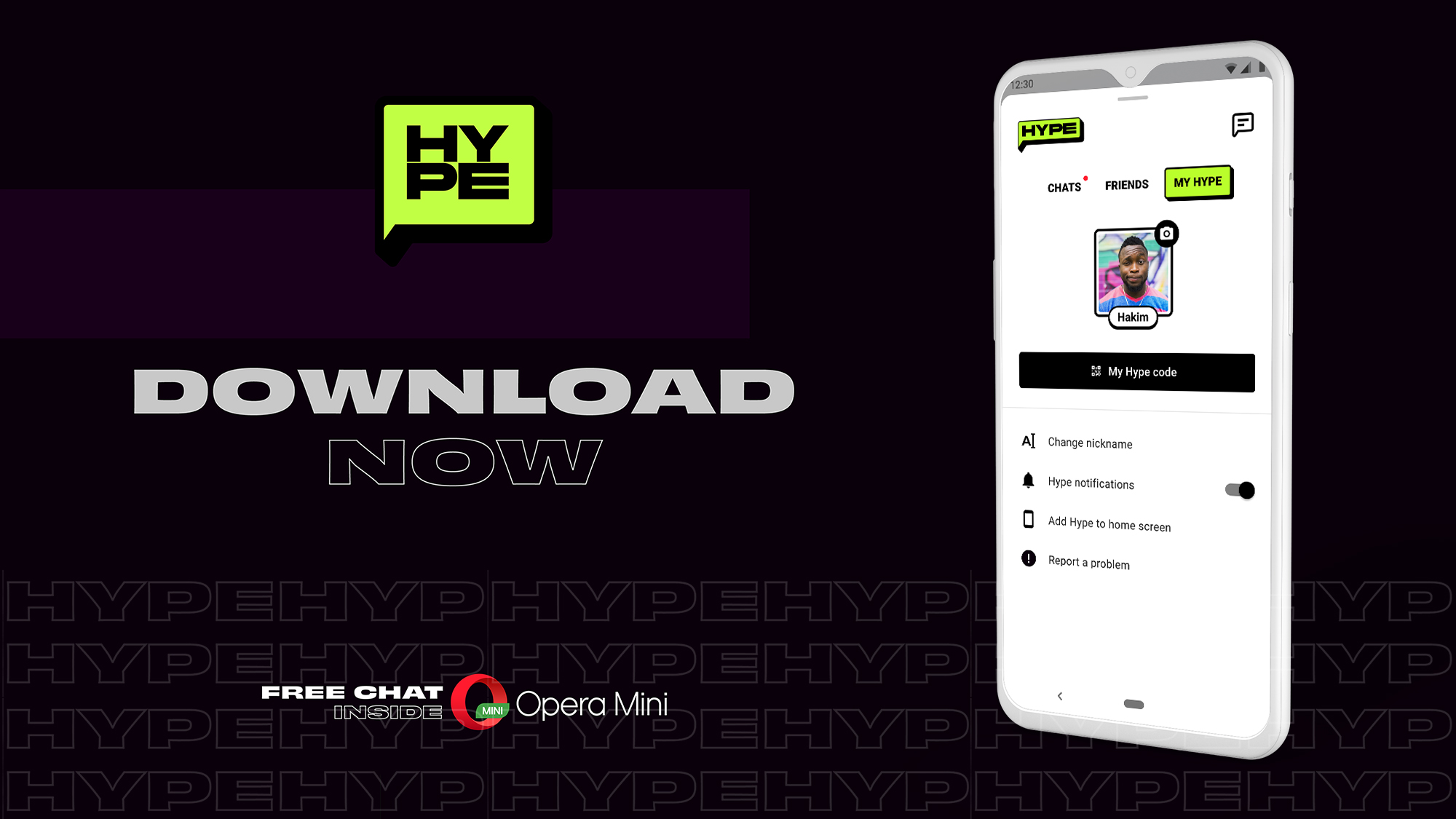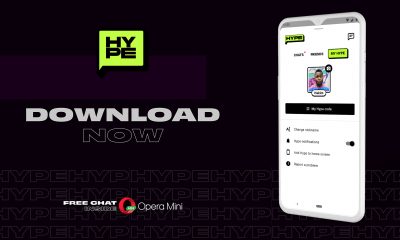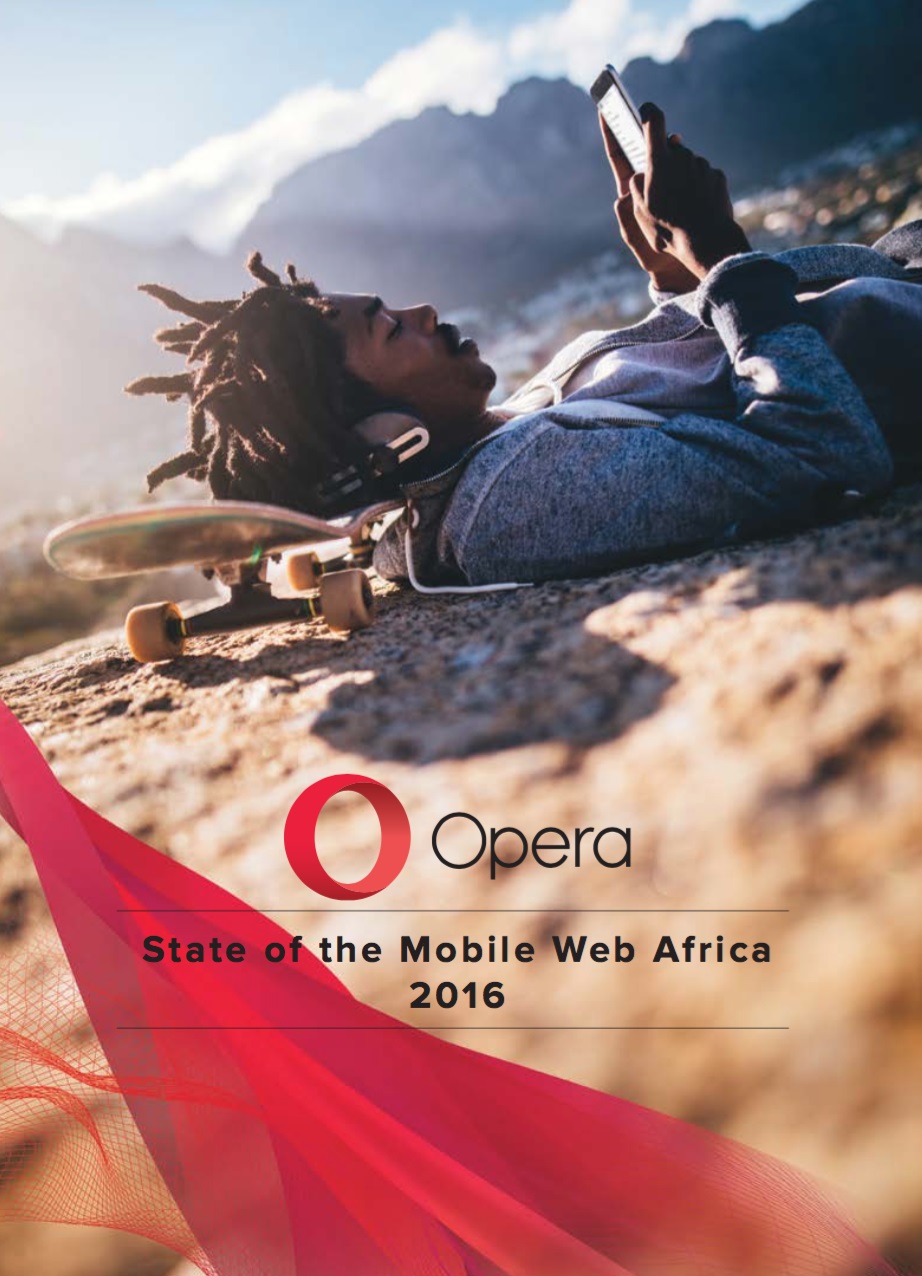Technology
Opera Launches ‘Hype’ Inbuilt Mobile Browser Chat

By Adedapo Adesanya
Norwegian app giant, Opera, has launched Hype, its new dedicated chat service built into the popular Opera Mini browser in Africa.
Set in the pilot market of Kenya, Hype is the first African inspired chat service built into a mobile browser.
With Hype, Opera reimagines the chat experience, with content sharing as a key feature; Opera Mini, with more than 100 million users worldwide, becomes the world’s first mobile browser with an integrated chat service.
With the introduction of Hype in the Opera Mini browser, Opera is rethinking the concept of mobile browsers providing its users with a personalized, engaging browsing experience that enables seamless surfing, chatting and sharing content– without compromising speed or driving increased data consumption.
Speaking on this, the Product Lead for Hype Mr Charles Hamel said, “Chat services and browsers are apps people use every day and feel very personal about.
“With the integration of Hype in Opera Mini, we are not only rethinking what a chat service should be like in 2021 but also changing the very definition of what a mobile browser should be.”
Hype is launching first in Kenya as a pilot market and starting today, users will be able to easily set up their Hype account and begin chatting with secure end-to-end encryption.
This launch is a facet of Opera’s emphasis on investing and growing its digital ecosystem in Africa, with the goal of bringing more people online; since 2018, Opera has grown its user base in Africa by 40 per cent.
Speaking further, Mr Hamel explained that, “Hype was developed first and foremost with African consumers in mind. Today, 40 per cent of the Kenyan population has access to smartphones, with younger generations dominating as 75 per cent of their 47 million inhabitants are under 30 years old.
“With such early adopter demographics at play, there is massive potential for the growth of Hype in Kenya. On top of that, we are also partnering with the leading telecommunication carriers in the country, offering daily free browsing to all Opera Mini users. We believe the combination of these factors will lead to the rapid adoption of Hype in the country.”
This announcement follows similar browser innovation from Opera, which was the first to integrate messenger services as part of their PC browser, in 2019.
Today, its more than 80 million users enjoy the integration of services such as Facebook messenger, Telegram, Whatsapp, Instagram and Twitter.
Looking further into the features, Hype infuses new formats like memes and stickers for users to express themselves, often relating to pop culture references and internet content they find. To make this easier and fun, Hype also adds WebSnap, a feature previously known from the Opera desktop browser, that allows users to take snapshots from the web.
Once a websnap is captured, users can edit it by adding colours, text, and emojis, making it fun and entertaining before sharing with others.
It also offers its users a series of stickers created by Kenyan artists Brian Omolo and Lulu Kitololo. These unique collections of stickers reflect everyday expressions used by Kenyans to provide users with a more engaging experience when communicating with others.
“This comes in handy as users no longer need to copy links from websites and switch between apps to share the content they want.
“We are extremely happy to celebrate African culture with Hype and we are very excited with the end result and the collaboration we had with Brian and Lulu.” added Mr Hamel.
“These unique stickers with original designs are something we are very proud of at Opera as we become the first major browser to integrate real African art and pop culture into our products.”
The introduction of Hype in Kenya is part of Opera’s Africa First business strategy, adopted three years ago by the Norwegian company. This strategy consists of four main pillars: 1) Develop products with African consumers in mind; 2) Invest and grow Opera’s digital ecosystem in the African region to bring more people online; 3) Partner with leading global and regional companies; and 4) Employ and collaborate with African colleagues and stakeholders.
The latest population census in Kenya, published in 2019, reported that the country is strongly youthful. Of Kenya’s 47 million inhabitants, 75 per cent are under 30 years old, with children and adolescents representing 63 per cent of the total population.
To this, Mr Hamel said, “Hype was developed first and foremost with African consumers in mind. Today, 40% of the Kenyan population has access to smartphones, with younger generations becoming early adopters of technology.
“With such demographics, there is massive potential for the growth of Hype in Kenya. On top of that, we are also partnering with Safaricom and Airtel, the leading carriers in the country, offering free daily browsing to all Opera Mini users.
“We believe the combination of these factors will lead to the rapid adoption of Hype in the country.”
In the fourth quarter of 2020, the Opera user base reached 380 million monthly active users worldwide, with nearly 150 million monthly active users (MAUs) based in Africa. Since the announcement of Opera’s Africa First strategy in Q1-2018, Opera has grown its user base by 40 per cent in the African region.
This rapid growth in the region gives Opera a unique position to scale its digital ecosystem infrastructure and leverage its brand awareness and recognition. Opera also gives more value to its users by introducing new products and features that truly address the needs of its users locally.
Technology
Leticia Otomewo Becomes Secure Electronic Technology’s Acting Secretary

By Aduragbemi Omiyale
One of the players in the Nigerian gaming industry, Secure Electronic Technology (SET) Plc, has appointed Ms Leticia Otomewo as its acting secretary.
This followed the expiration of the company’s service contract with the former occupier of the seat, Ms Irene Attoe, on January 31, 2026.
A statement to the Nigerian Exchange (NGX) Limited on Thursday said Ms Otomewo would remain the organisation’s scribe in an acting capacity, pending the ratification and appointment of a substantive company secretary at the next board meeting.
She was described in the notice signed by the Managing Director of the firm, Mr Oyeyemi Olusoji, as “a results-driven executive with 22 years of experience in driving business growth, leading high-performing teams, and delivering innovative solutions.”
The acting secretary is also said to be “a collaborative leader with a passion for mentoring and developing talent.”
“The company assures the investing public that all Company Secretariat responsibilities and regulatory obligations will continue to be discharged in full compliance with the Companies and Allied Matters Act, applicable regulations, and the Nigerian Exchange Limited Listing Rules,” the disclosure assured.
Meanwhile, the board thanked Ms Attoe “for professionalism and contributions to the Company during the period of her engagement and wishes her well in her future endeavours.”
Technology
Russia Blocks WhatsApp Messaging Service

By Adedapo Adesanya
The Russian government on Thursday confirmed it has blocked the WhatsApp messaging service, as it moves to further control information flow in the country.
It urged Russians to use a new state-backed platform called Max instead of the Meta-owned service.
WhatsApp issued a statement earlier saying Russia had attempted to “fully block” its messaging service in the country to force people toward Max, which it described as a “surveillance app.”
“Today the Russian government attempted to fully block WhatsApp in an effort to drive people to a state-owned surveillance app,” WhatsApp posted on social media platform X.
“Trying to isolate over 100 million users from private and secure communication is a backwards step and can only lead to less safety for people in Russia,” it said, adding: “We continue to do everything we can to keep users connected.”
Russia’s latest move against social media platforms and messaging services like WhatsApp, Signal and Telegram comes amid a wider attempt to drive users toward domestic and more easily controlled and monitored services, such as Max.
Russia’s telecoms watchdog, Roskomnadzor, has accused messaging apps Telegram and WhatsApp of failing to comply with Russian legislation requiring companies to store Russian users’ data inside the country, and of failing to introduce measures to stop their platforms from being used for allegedly criminal or terrorist purposes.
It has used this as a basis for slowing down or blocking their operations, with restrictions coming into force since last year.
For Telegram, it may be next, but so far the Russian government has been admittedly slowing down its operations “due to the fact that the company isn’t complying with the requirements of Russian legislation.”
The chat service, founded by Russian developers but headquartered in Dubai, has been a principal target for Roskomnadzor’s scrutiny and increasing restrictions, with users reporting sluggish performance on the app since January.
Technology
Nigerian AI Startup Decide Ranks Fourth Globally for Spreadsheet Accuracy

By Adedapo Adesanya
Nigerian startup, Decide, has emerged as the fourth most accurate Artificial Intelligence (AI) agent for spreadsheet tasks globally, according to results from SpreadsheetBench, a widely referenced benchmark for evaluating AI performance on real-world spreadsheet problems.
According to the founder, Mr Abiodun Adetona, the ranking places Decide alongside well-funded global AI startups, including Microsoft, OpenAI, and Anthropic.
Mr Adetona, an ex-Flutterwave developer, also revealed that Decide now has over 3,000 users, including some who are paying customers, a signal to the ability of the startup to scale in the near future.
SpreadsheetBench is a comprehensive evaluation framework designed to push Large Language Models (LLMs) to their limits in understanding and manipulating spreadsheet data. While many benchmarks focus on simple table QA, SpreadsheetBench treats a spreadsheet as a complex ecosystem involving spatial layouts, formulas, and multi-step reasoning. So far, only three agents rank higher than Decide, namely Nobie Agent, Shortcut.ai, and Qingqiu Agent.
Mr Adetona said SpreadsheetBench measures how well AI agents can handle practical spreadsheet tasks such as writing formulas, cleaning messy data, working across multiple sheets, and reasoning through complex Excel workflows. Decide recorded an 82.5% accuracy score, solving 330 out of 400 verified tasks.
“The result reflects sustained investment in applied research, product iteration, and learning from real-world spreadsheet workloads across a wide range of use cases,” Mr Adetona told Business Post.
For Mr Adetona, who built Decide out of frustration with how much time professionals spend manually cleaning data, debugging formulas, and moving between sheets, “This milestone highlights how focused engineering and domain-specific AI development can deliver frontier-level performance outside of large research organisations. By concentrating on practical business data problems and building systems grounded in real user environments, we believe smaller teams can contribute meaningfully to advancing applied AI.”
“For Decide, this is a foundation for continued progress in intelligent spreadsheet and analytics automation,” he added.
-

 Feature/OPED6 years ago
Feature/OPED6 years agoDavos was Different this year
-
Travel/Tourism10 years ago
Lagos Seals Western Lodge Hotel In Ikorodu
-

 Showbiz3 years ago
Showbiz3 years agoEstranged Lover Releases Videos of Empress Njamah Bathing
-

 Banking8 years ago
Banking8 years agoSort Codes of GTBank Branches in Nigeria
-

 Economy3 years ago
Economy3 years agoSubsidy Removal: CNG at N130 Per Litre Cheaper Than Petrol—IPMAN
-

 Banking3 years ago
Banking3 years agoSort Codes of UBA Branches in Nigeria
-

 Banking3 years ago
Banking3 years agoFirst Bank Announces Planned Downtime
-

 Sports3 years ago
Sports3 years agoHighest Paid Nigerian Footballer – How Much Do Nigerian Footballers Earn


















